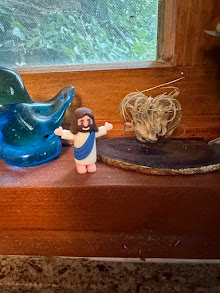Wasn't always that way. Back in a previous period of anxiety, of turmoil, chaos, and upheaval in the Mideast, of insecurity, doubt, and apprehension in the United States, the Missouri State Capitol and other public buildings went dark as part of a campaign to conserve energy championed by none other than the President of the United States, Jimmy Carter.
The late '70s and particularly the year 1979 is back in the public spotlight this fall. The events of 1979 seemed far less dated and more topical to Blake and me than the dark rimmed plastic eyeglasses and long hair of the characters in 'Argo'. We remember the first Nightline (with Ted Koppel) the news show born of the Iranian hostage crisis and a harbinger of the all news, all the time cable networks yet to come. We watched from our living room in Tarkio in the house we bought after Ann was born in the summer of '80. But we saw Jimmy Carter give his 'crisis of confidence' speech in the tiny little house in the bottom in 1979, with the image flickering on the screen as the rooftop antenna swayed in the unremitting wind. The Soviet Union had invaded Afghanistan; the Iranians burned our flags; inflation measured 11 percent while unemployment was stuck at 7.5 percent. The ugly word 'stagflation', coined during Nixon's presidency, reappeared in the papers. We were a young family watching our savings wither under banana republic type inflation; we decided to buy that house in Tarkio because we couldn't foresee a time when land prices and interest rates would be affordable for folks like us.
I can't tell you I remember every detail like it was yesterday. But I do recall, and quite vividly, the general despondency of Americans that year, the feeling of disconnect, impotency, frustration and even anger with our situation domestically and overseas. Despite effort, exhortation, and example, the economy tilted into an energy 'crisis'. What do I remember from 1979? I remember being told to 'make do with less', that solving our energy problems amounted to the 'moral equivalent of war'. For instance, from the 1979 'crisis of confidence' speech:
I want to talk to you right now about a fundamental threat to American democracy.
I do not mean our political and civil liberties. They will endure. And I do not refer to the outward strength of America, a nation that is at peace tonight everywhere in the world, with unmatched economic power and military might.
The threat is nearly invisible in ordinary ways. It is a crisis of confidence. It is a crisis that strikes at the very heart and soul and spirit of our national will. We can see this crisis in the growing doubt about the meaning of our own lives and in the loss of a unity of purpose for our nation.
When efforts to rescue the hostages left images of burning helicopters imprinted on our television screens, it only served to emphasize the inadequacy of all things American. The piece' de resistance' of this spiral was the black comedy skit filmed from afar of our President beating off a 'killer rabbit' swimming toward him on a Georgia lake. Was it any wonder we felt infected by 'malaise'?
I heard a podcast today with a segment focused on 'bad' presidents. Herbert Hoover and Woodrow Wilson were held up as examples: one because of protectionism and his inability to keep the people's faith during the darkest days of the Depression even as he threw program after program into the fray, the other because he refused to admit his idealistic schemes and plans based on crystallized academic theorizing simply didn't work with real people representing real national interests. The people simply wouldn't behave as he believed they ought.
We voted in that election in 1980; Blake and I stayed up way past our bedtime watching the results after the girls were tucked in their beds. Perhaps polling has improved, or all that media is gathering more data; all I know is that we were not alone in our astonishment at the results of that election. It wasn't just that Mr. Reagan won; it was the toppling of seemingly safe incumbents in the Senate from sea to shining sea. It was the out and out upsetting of the apple cart as America looked into the dark tunnel of malaise and shrinking and making do and said, Thanks but no thanks.
Jimmy Carter spoke these words in his Inaugural speech:
"We have learned that more is not necessarily better, that even our great nation has its recognized limits, and that we can neither answer all questions nor solve all problems."[2]
And on January 20, 1981 Ronald Reagan used this text:
"We have every right to dream heroic dreams. Those who say that we are in a time when there are no heroes just don't know where to look. You can see heroes every day going in and out of factory gates. Others, a handful in number, produce enough food to feed all of us and then the world beyond. You meet heroes across a counter--and they are on both sides of that counter. There are entrepreneurs with faith in themselves and faith in an idea who create new jobs, new wealth and opportunity. They are individuals and families whose taxes support the Government and whose voluntary gifts support church, charity, culture, art, and education. Their patriotism is quiet but deep. Their values sustain our national life.
I have used the words "they" and "their" in speaking of these heroes. I could say "you" and "your" because I am addressing the heroes of whom I speak--you, the citizens of this blessed land. Your dreams, your hopes, your goals are going to be the dreams, the hopes, and the goals of this administration, so help me God.
Can we solve the problems confronting us? Well, the answer is an unequivocal and emphatic "yes." To paraphrase Winston Churchill, I did not take the oath I have just taken with the intention of presiding over the dissolution of the world's strongest economy."
Jimmy Carter spoke these words in his Inaugural speech:
"We have learned that more is not necessarily better, that even our great nation has its recognized limits, and that we can neither answer all questions nor solve all problems."[2]
And on January 20, 1981 Ronald Reagan used this text:
"We have every right to dream heroic dreams. Those who say that we are in a time when there are no heroes just don't know where to look. You can see heroes every day going in and out of factory gates. Others, a handful in number, produce enough food to feed all of us and then the world beyond. You meet heroes across a counter--and they are on both sides of that counter. There are entrepreneurs with faith in themselves and faith in an idea who create new jobs, new wealth and opportunity. They are individuals and families whose taxes support the Government and whose voluntary gifts support church, charity, culture, art, and education. Their patriotism is quiet but deep. Their values sustain our national life.
I have used the words "they" and "their" in speaking of these heroes. I could say "you" and "your" because I am addressing the heroes of whom I speak--you, the citizens of this blessed land. Your dreams, your hopes, your goals are going to be the dreams, the hopes, and the goals of this administration, so help me God.
Can we solve the problems confronting us? Well, the answer is an unequivocal and emphatic "yes." To paraphrase Winston Churchill, I did not take the oath I have just taken with the intention of presiding over the dissolution of the world's strongest economy."


















No comments:
Post a Comment